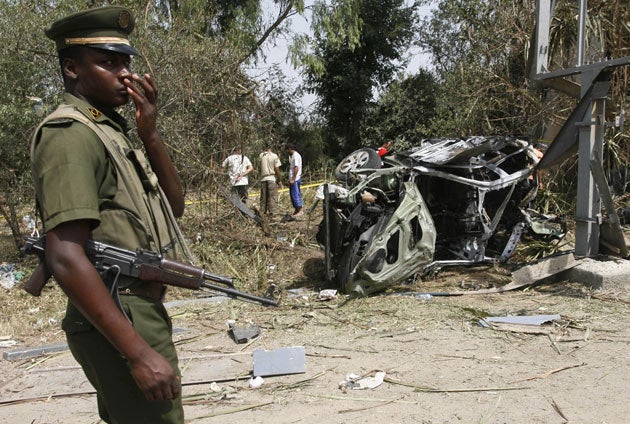Algeria bomb kills 43

A bomb attack east of Algiers has killed 43 people and wounded 38, in one of country's bloodiest incidents in years.
A ministry statement carried by the official APS news agency said the attack targeted a paramilitary gendarmerie training school at Issers, 34 miles east of the capital.
The bombing follows several recent attacks by al Qaeda's north African wing, but there was no immediate claim of responsibility.
The local al Qaeda affiliate has claimed several attacks in the past including the twin suicide bombings of U.N. offices and a court building in Algiers in December 2007, which killed 41 people, 17 of them United Nations staff.
Witnesses said Tuesday's attack was carried out by a suicide bomber who rammed his car into a group of prospective recruits lining up to get into the school for qualifying exams.
"Most of the dead were young men aged between 18 and 20. They were in line waiting to enter the school for recruiting exams when they were mowed down by the blast," a witness said by telephone.
"The car explosion destroyed part of the outer wall of the school and blew a huge crater into the ground, about three meters (yards) from the main gate," he added.
APS said the blast damaged the facades of several houses and other buildings near the school and hit cars and other vehicles on nearby roads, wounding several passengers.
Many Algerian youth see military jobs as an opportunity for a better future amid fierce competition for their hearts and minds between the country's powerful military and radical Islamists, analysts say.
In recent months the mountainous areas east of Algiers have seen numerous attacks by al Qaeda's north Africa wing, which is fighting to set up purist Islamic rule in Algeria, a major oil and gas supplier to Europe.
The group has links with like-minded militants in other Maghreb countries and is the most effective rebel group in the country of 34 million, which is emerging from more than a decade of conflict with Islamist rebels that began in 1992.
Rebels "on the ground"
Algerian papers said rebels linked to al Qaeda had killed eight policemen, three soldiers and a civilian in successive ambushes in eastern Algeria on Sunday. El Watan said victims of the first ambush were shot dead and then had their throats slit.
A suicide car bombing killed at least six civilians in Zemmouri, also east of Algiers, on Aug 10 in an attack on a coast guard barracks and an adjacent post of the gendarmerie.
The government said the attack may have been retaliation for an army ambush that killed 12 rebels in mountainous Kabylie region during the night of August 7 to 8.
Newspapers have said that ambush was part of the army's pursuit of rebels who orchestrated a suicide car bombing which wounded 25 people in Tizi Ouzou town east of Algiers on Aug 3.
That attack was claimed by al Qaeda's north Africa wing, the al Qaeda Organisation in the Islamic Maghreb. There was no immediate claim of responsibility for the Aug. 10 attack or those reported by El Watan on Tuesday.
"We have to worry about the security situation now. We should not play down the terrorist menace as the authorities are doing," said political analyst Mahmoud Belhimer.
"Tuesday's attack showed that they (the rebels) are well-entrenched on the ground and seem to be able to hit significant targets," he added.
Conflict began in Algeria in 1992 when a military-backed government scrapped legislative elections a radical Islamic party was poised to win. About 150,000 people have died during the ensuing violence.
The large scale bloodshed has subsided in recent years and in 2006 the government freed more than 2,000 former Islamist guerrillas under an amnesty designed to put an end to the conflict.
But a hard core of several hundred rebels fights on as members of al Qaeda's local wing, which was previously known as the Salafist Group for Preaching and Combat, or GSPC.
The group's leader, Abdelmalek Droukdel, told the New York Times last month that increasing numbers of young men around the region were joining the group, frustrated with persistent poverty and angry at what he called the West's war on Islam.
Join our commenting forum
Join thought-provoking conversations, follow other Independent readers and see their replies
Comments
Bookmark popover
Removed from bookmarks